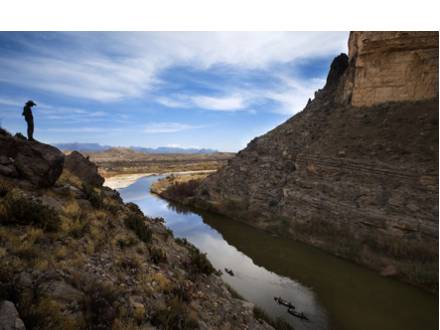Does the Federal Government Have a Say in Texas Water Rights?
 Water rights are now becoming highly political as the federal government seeks to control certain water rights in the state of Texas. Because supplies are limited, water is one of the state’s most valuable natural resources. In June 2024, the U.S. Supreme Court ruled 5-4 against a proposed agreement between Texas and New Mexico regarding the management of water in the Rio Grande. The agreement—which initially included Colorado—was intended to end years of water disputes between the states and fairly divide the Rio Grande basin water.
Water rights are now becoming highly political as the federal government seeks to control certain water rights in the state of Texas. Because supplies are limited, water is one of the state’s most valuable natural resources. In June 2024, the U.S. Supreme Court ruled 5-4 against a proposed agreement between Texas and New Mexico regarding the management of water in the Rio Grande. The agreement—which initially included Colorado—was intended to end years of water disputes between the states and fairly divide the Rio Grande basin water.
The water compact relies on an irrigation system managed by the Bureau of Reclamation to distribute water from the Reservoir in Elephant Butte, New Mexico, to NM, TX, and Mexico. In 2022, after dealing with these issues since the initial 1938 agreement, the two states came to an agreement that neatly sidestepped any federal interests. The case went to the Supreme Court, which said the agreement between the states would negatively impact the current Mexico international water treaty. The Supreme Court majority stated, "…we cannot now allow Texas and New Mexico to leave the United States up the river without a paddle."
This ruling could set a precedent for future water cases and affect water access for landowners in TX and NM. As increased water usage puts a strain on resources, this latest instance of the federal government’s interference in states’ rights is creating significant concern among landowners who currently have at least some access to the Rio Grande. If you have an issue regarding water rights on your Texas property, you need a knowledgeable Tarrant County, TX natural resources attorney to help you sort it out.
How Does Texas Regulate Water Rights?
Water comes from either groundwater or surface water. Surface water is water found in streams, bays, rivers, lakes, and ponds. Groundwater accumulates in underground aquifers after filtering down from the earth’s surface. Almost 80 percent of all groundwater used in the state is used to irrigate crops, while the majority of surface water is used for industries and to supply water to cities.
Surface water is owned and controlled by the state, and landowners may only use surface water under certain circumstances without a permit from the TCEQ (Texas Commission on Environmental Quality). If landowners want to use surface water for irrigation or other purposes, such use may require a permit, except for stock tanks, which fall under an exception. Diffused water—water that comes from rainfall or snowmelt—is the property of the landowner until it enters a stream, lake, pond, river, or other natural watercourse.
Under Texas Water Code Section 11.142, those who own property bordered by or crossed by the Rio Grande can draw water from the river for domestic and livestock use, including watering a lawn. They may take water for reasonable use and are protected against unreasonable use by others. It is unclear at present how the recent ruling may affect these individual rights.
Where Does the Rio Grande Water Issue Go From Here?
U.S. Supreme Court Justice Neil Gorsuch, one of the four dissenting Justices, has concerns that the ruling could have far-reaching effects, granting the federal government the power to veto future water disputes between states. Gorsuch found the decision to be "short-sighted." The Supreme Court decision sends the case back to the 8th U.S. Circuit Court of Appeals, which will likely reopen negotiations between the two states—with plenty of input from the federal government.
Contact a Hood County, TX Natural Resources Attorney
If you are currently facing water rights issues or issues pertaining to any other natural resources, you could benefit from having an experienced attorney by your side. Whether you have an issue related to eminent domain, easements, acquisitions, water wells, groundwater, or other water contracts, a highly skilled Hill County, TX, natural resources attorney from Cain & Kiel Law can help. We help our clients navigate these legal issues, no matter how simple or complex. Water will continue to be more precious, so schedule a consultation with Cain & Kiel Law at 817-645-1717 today.
We're Here When You're Ready
To set up a consultation with our attorneys and get the legal help you need, please call 817-645-1717 or fill out the form below:
The use of the Internet or this form for communication with the firm or any individual member of the firm does not establish an attorney-client relationship. Confidential or time-sensitive information should not be sent through this form.
I have read and understand the Disclaimer and Privacy Policy.

 817-645-1717
817-645-1717









